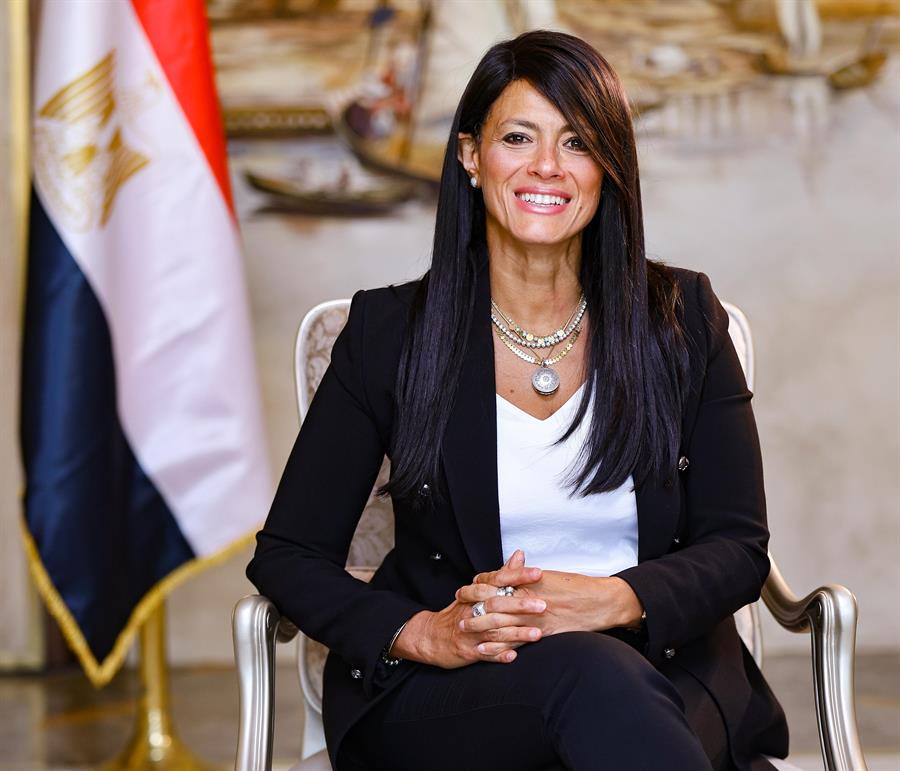Egypt's Minister of Planning follows up on 'Be An Ambassador' training courses

25 July 2021
Minister of Planning and Economic Development and Chairperson of the Board of Trustees of the National Institute for Governance and Sustainable Development(NIGSD) Dr. Hala al-Said witnessed on Sunday a part of the training of the second group of the "Be an Ambassador" initiative.
During her speech, Dr. Hala El-Said said that the initiative was designed to spread a culture of sustainable development among young people in a peer-to-peer learning method.
"After graduating from the training program and passing all stages of testing and evaluation, these young people will be able to pass the information on to other young people in universities and governorates," El-Said explained.
El-Said stressed the ministry's keenness to implement the sustainable development goals in the evaluation and selection process, especially since the participating youth represent all governorates, in addition to taking into account gender, and representing people with special abilities, to ensure opportunities for all.
El-Said referred to the interest of the Egyptian government in general and the Ministry of Planning in particular in the topics and applications of sustainable development, as Egypt was one of the first countries to launch a vision for sustainable development in a participatory manner.
"Egypt also launched its national economic reform program in 2016, a program that achieved success and economic returns that helped confront the Covid-19 pandemic and mitigate its effects," She added.
The Minister of Planning explained that it was necessary to update Egypt's Vision 2030 and take into account regional and global changes.
She highlighted the launch of the second phase of the National Economic Reform Program, a phase of structural reforms focusing on the sectors of agriculture, industry, communications, and information technology.
El-Said noted that Egypt issued its third voluntary national report (3rd VNR) at the high-level political forum at the United Nations a few days ago, which reviews the efforts of the Egyptian government in terms of policies, programs, and initiatives towards achieving sustainable development goals.
"Egypt was among only ten countries around the world that submitted a voluntary national report for the third time." She said
El-Said added that Egypt has recently succeeded in listing four Egyptian initiatives on the SDGs Good Practices platform of the United Nations Department of Economic and Social Affairs.
The four initiatives are the presidential initiative of Decent Life, the integrated system for preparing and following up the investment plan, the local development program in Upper Egypt, and the Rowad 2030 project.
El-Said pointed to the launch of the "Be an Ambassador" initiative in October 2020, in cooperation with the Ministry of Planning and Economic Development and NIGSD - the training arm of the ministry - to spread awareness and sustainability thinking through youth.
El-Said added that Egypt is distinguished by the fact that 60% of its population is young people under the age of thirty, hence we needed to launch the first batch directed to young people.
El-Said indicated that she received about 7,000 applications to join the initiative when it was launched until about 1,000 young men and girls were chosen as a first group, which included young people from student unions, the Red Crescent, and young faculty members from public and private universities.
During the training, the Minister of Planning and Economic Development conducted an open discussion with the young trainees and answered their questions about issues related to the implementation of sustainable development goals in the governorates and Egypt's Vision 2030.
The "Be an Ambassador" initiative is divided into three levels: the (Qualification Level) which includes online training programs on self-marketing skills such as designing a presentation, writing a CV, communication skills, and others.
The second level is the (Advanced Level) which includes recorded lectures on various sustainable development topics for a month, by a group of international and local Egyptian experts.
While the third level, which is the (Specialized Level), includes a one-week TOT training program, which is direct training with a limited number of students to ensure effective communication.









